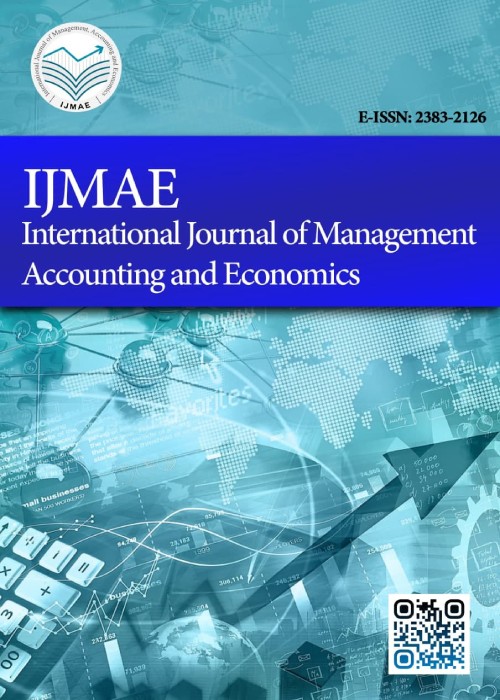فهرست مطالب
International Journal of Management, Accounting and Economics
Volume:2 Issue: 2, Feb 2015
- تاریخ انتشار: 1394/01/29
- تعداد عناوین: 7
-
Pages 111-124The acceptance of the SSTs by the banking customers has been recognized as one of the crucial aspects in the success of SST implementation. The researchers, at various points of time and in different contexts, have highlighted the need for the identification of the factors affecting the acceptance of the SSTs. In this regard, technology adoption propensity of the customers and its relationship with socio-economic characteristics, technology attributes and facilitating conditions has been unveiled as the most important aspect. Taking this into consideration, the present paper has been framed to analyze technology adoption propensity of the customers in India by focusing on the three aforementioned facets. Accordingly, the results have highlighted significant association of age, income and qualification of the customers with their propensity to adopt technology. Also, significant connection of technology adoption propensity of the customers with facilitating conditions, perceived usefulness and perceived ease of use has also been unveiled from the results of the study. Based on the findings, the study has recommended the need for framing strategies focusing on the three aforementioned facets as an effective measure for enhancing acceptance of the SSTs among the customers in India.Keywords: Technology adoption propensity, perceived usefulness, perceived ease of use, customer acceptance of technology
-
Pages 125-135Foreign aid is one of the most important policy tools that rich countries use for helping poor countries to improve population well-being and facilitate economic and institutional development. The concept of foreign aid or official development assistance (ODA) is widely used and accepted as a flow of financial resources from developed countries to developing countries on development grounds. However, the role and effects of foreign aid in the economic growth of developing countries have been and are controversial issues. This paper investigates the relationship between foreign aid and growth in per capita GDP using annual data from the 1980 to 2012 period for a sample of Iran. Three time series techniques (CCR, FMOLS and DOLS) were utilized to estimate the co-integrating equations. The results show that in long-run, effect of foreign aid on economic growth is positive, statistically significant, and sizable. Therefore, aid is more productive than domestic resources and other capital inflows.Keywords: Foreign Aid, Economic Growth, Co, integration Techniques
-
Pages 136-143In the current commercial environment, the role of accountants is important. Indeed, accountants have key role in success and dynamics of organizations. Based on their vital role in organization, it can be said we can rely on the accountants and the results of their work as we can consider suitable level of professional ethics. Achieving accounting goal without ethics is impossible. Indeed, the society has great expectations of these people and the people should trust in the services presented by this group. Thus, the information presented by accountants should be reliable and non-biased. Thus, accountants should have high honesty. This study investigates the role of ethics in accounting.Keywords: Professional ethics, Professional behavior, Accounting
-
Pages 144-148The current research attempts to investigate the relationship between the free cash follow and capital structure and value of listed companies in Tehran Stock Exchange. For this reason, 80 companies were investigated during 2009-2013. Lehn. & poulsen and debt leverage models were used to measure the free cash flow and capital structure respectively. The firm value was also calculated by Tobin’s Q. Findings showed that free cash flow and capital structure have significant and positive effects on firm value.Keywords: Free cash flow, capital structure, firm value
-
Pages 149-152This study investigated the relationship between capital structure and firm performance in firms operating on the Tehran Stock Exchange (TSE). Capital structure was measured by debt leverage. Firm performance was measured using the Tobin’s Q. The sample size was 100 companies operating on the exchange during 2008-2013. The results showed a significant positive relationship between capital structure and firm performance.Keywords: Capital structure, Debt leverage, Tobin's Q, Firm performance
-
Pages 153-155This article is in the form of a viewpoint, presenting the need of the support from academic journals to contribute through calls for publishing studies in the area of performance analysis system development for businesses and industries. The paper starts with a short review of current performance analysis models and concludes with the highlights of gap of a total model.Keywords: Performance, Performance measurement, Management
-
Pages 156-166The subject of “participatory” and “observing” societies in the area of politics and society throughout the world is associated with the topic of “people participation in determining destiny” and “monitoring the performance of government and states” and this has been studied since many years ago from the perspectives of sociologists and lawyers in their specialized aspects. The significant issue prior to the study and dealing with the subject of people supervision over the performance of governments is that to the extent that the circulation of information is done freely, and also to the extent that the volume of information transferred among the people (either through websites, news agencies and governmental media or through social networks) is greater, to the same extent (not only the promotion of people’s information rate towards issues around them in the society and quality of their perception of the incidents will be deeper but also the sense of peoples’ participation and responsibility acceptance vis-à-vis society and other citizens and hope in determination of their destiny will increase. So, in this article, efforts have been made to provide a clear elaboration of the subject of “people participation” and its connection with the “supervision over the performance of governments and rulers” and the necessity of this supervision from the viewpoint of Islam and scientific theories.Keywords: Supervision, Sovereignty, Government, Law, Islam, Iran


